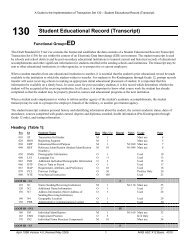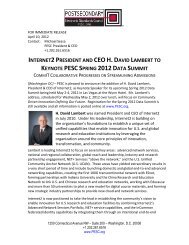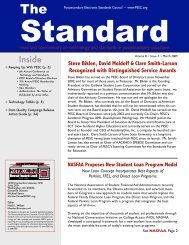February 2013 - PESC
February 2013 - PESC
February 2013 - PESC
You also want an ePaper? Increase the reach of your titles
YUMPU automatically turns print PDFs into web optimized ePapers that Google loves.
2012 Survey of Chief Information Officers<br />
9<br />
Potential Benefits of Consumerization<br />
Impact on IT Staff Training and Development<br />
None<br />
5.0%<br />
No, it is not having any IT staff impact<br />
18.0%<br />
Less need for community labs<br />
43.5%<br />
Yes, we need to hire new people with different skills<br />
29.5%<br />
More competitive positioning for your institutions<br />
48.5% 6.1%<br />
Less IT staff needed<br />
Freedom of choice<br />
Financial Savings<br />
Top 5 Potential Problems with Consumerization<br />
Integration with existing systems<br />
Data integrity consistency<br />
Greater security issues/problems<br />
More bandwidth needed<br />
More staff needed for support<br />
Early in the onset of the consumerization movement,<br />
some thought that consumerization might drive<br />
cost savings on the college campus by triggering<br />
11.5%<br />
78.0%<br />
40.0%<br />
77.1%<br />
52.2%<br />
94.5%<br />
73.6%<br />
56.7% 6.1%<br />
Yes, more training/professional development needed<br />
with curent staff<br />
69.0%<br />
the incremental removal or reduction of IT-provided<br />
devices. However, to date CIOs are not seeing this<br />
as an advantage. Rather, CIOs see the advantages of<br />
consumerization residing in intangibles, such as freedom<br />
of choice at 78% and competitive positioning for their<br />
respective institutions at 48.5%. These numbers track<br />
close to 2011 numbers illustrating this point well.<br />
CIOs are quick to cite numerous challenges associated<br />
with the consumerization movement. Heightened security<br />
issues are cited first at 95%, followed by integration<br />
issues at 77%. Listed third are bandwidth issues at<br />
73%. Thus, it follows that IT planning is crucial when<br />
it comes to consumerization. For the most part, these<br />
percentages track closely to 2011 numbers. However, it<br />
is worth noting that bandwidth concerns saw a jump from<br />
62% to almost 74%, which underscores the pressure<br />
that CIOs are feeling with respect to their network<br />
infrastructure.<br />
CIOs weighed in on how IT consumerization was affecting<br />
their staff. The most revealing evidence of this seems to<br />
be in the escalating need for staff development to learn<br />
how to support the plethora of new devices appearing<br />
on campus. The survey shows that almost 70% of<br />
CIOs believe that more staff training and development<br />
is needed to cope with all of the new devices and<br />
applications that consumerization brings. In addition,<br />
almost 30% of the CIOs participating in the study assert<br />
that they need to recruit new staff with different skill sets<br />
to support this new generation of users and devices.<br />
This indication begins to illustrate the shift away from the<br />
typical desktop support staffing models to more diverse<br />
support paradigms that are focused on mobile devices.
















